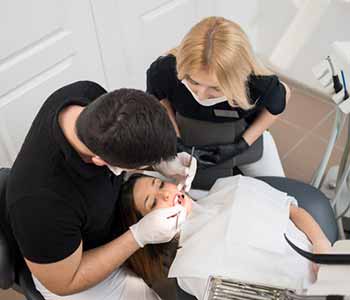The best ways to keep your gums healthy, explained by a dentist in Brampton ON
Brampton, ON patients searching for a “dentist near me” are usually looking for ways to improve oral health. Do I have cavities? Are my teeth straight enough? Shouldn’t they be brighter? We frequently hear these and similar questions. However, there is another important, and often forgotten, question. Are my gums healthy?
Never underestimate the importance of periodontal health
Gum disease is preventable, and it is easily treatable when detected early. Yet, about half of Canadian adults have some form of gum disease. In fact, it is so prevalent that it is the leading cause of adult tooth loss.
Why aren’t more people taking a proactive approach to periodontal health? The reason is simple. They usually don’t know they have a problem. Gum disease is painless, and has few noticeable symptoms, especially in the initial stages. It begins with bacteria-laden plaque along the gum line, which leads to deeper infection. Over time, inflamed gum tissue separates from the tooth root surface, creating pockets that collect even more bacteria.
Untreated gum disease can damage the periodontal ligament, bone, and other supporting structures, eventually causing teeth to become loose and fall out. Even more concerning, it can be linked to a variety of systemic medical problems, including coronary disease, stroke, and Alzheimer’s.
When diagnosed and treated early, gum disease can usually be stopped before serious damage occurs. Even in the advanced stages, gum disease is treatable, and oral health can be restored. However, the best solution is to stop it before it starts.
Schedule an Appointment today.
Five ways to keep your gums healthy

Maintaining good periodontal health involves a combination of healthy habits and preventive dental care.
- Brush and floss – Most people say that they practice good oral hygiene. All too often, that statement simply means they brush their teeth, most of the time anyway. Some days they skip, and floss is mistakenly considered optional. Good hygiene means thoroughly brushing at least twice a day and flossing at least once daily. It only takes a few minutes a day, and can help you avoid a lifetime of oral health problems.
- No nicotine – Surely you know that there is a long list of ways smoking endangers your health. You may not know that an increased risk of gum disease is on that list. If you smoke, there is no better time than now to kick the habit – and if you don’t smoke, don’t start.
- Eat right – Your teeth and gums need nutrition too. Foods high in vitamins and antioxidants can help boost your immune system, enabling your body to fight back against gum disease and other infection.
- Manage health conditions – Your mouth is part of your whole body, so oral health is part of whole health. The connection between oral disease and other health conditions, known as the oral systemic link, is two-way. Untreated gum disease may increase your risk of developing other diseases. Similarly, uncontrolled diabetes and other conditions can put you at higher risk for gum disease.
- See a dentist regularly – Don’t wait until you notice a problem. Preventive dentistry is one of the most powerful weapons against gum disease. Professional teeth cleaning removes plaque and tartar buildup in hard to clean areas, and your hygienist can give you tips for more effective brushing and flossing techniques. Additionally, if you do develop cavities, gingivitis, or other oral disease, it can be detected and treated in the early stages.
Know the symptoms of disease

How can you tell if your gums are healthy? Although gum disease is painless, it does have a few warning signs, if you know what to watch for. If you answer yes to any of these questions, you may need to see a dentist for periodontal evaluation.
- Are your gums unnaturally pale, reddish, or otherwise discolored?
- Do your gums bleed when you are brushing your teeth?
- Do you suffer from chronic bad breath, no matter what you’ve eaten?
- Do your gums look puffy or feel tender to the touch?
- Are any of your teeth loose?
- Is your gum line receded?
- Does the gum tissue seem loose or separated from your teeth?
- Do you frequently get abscesses or sores on your gums?
We are your partners in great oral health. If you have any symptoms of gum disease, or it has been more than six months since your last check-up, give us a call at (905) 791-7549 and schedule an appointment.

